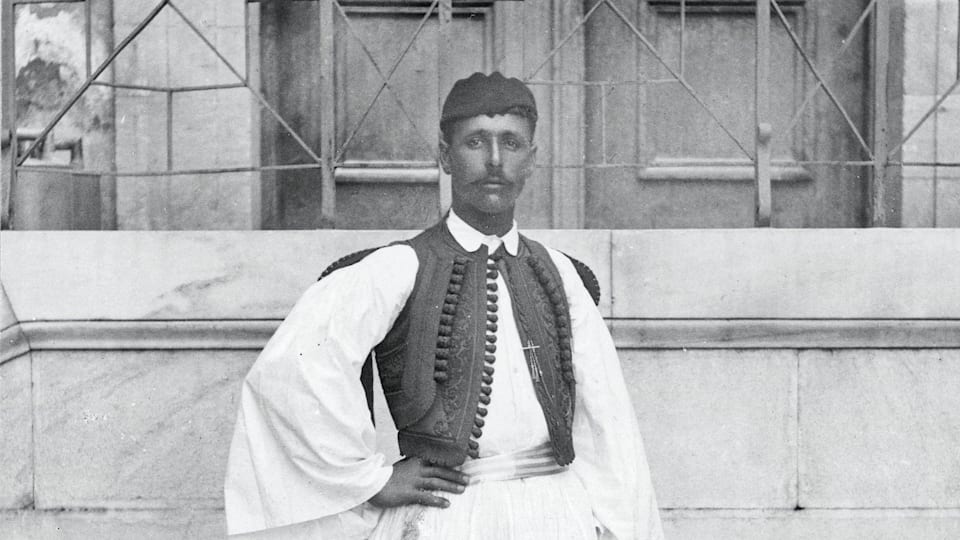This week in Olympic sports history: April 8 -14
Olympics.com looks at the week in Olympic sports history, picking out some Olympian birthdays and notable sporting events for the week of April 8-14.

Welcome to This Week in Olympic Sports History, where Olympics.com remembers the most significant sports events of the past. This week covers events from 8 - 14 April.
On this Day - April 10, 1896: Spyridon Louis wins first Olympic marathon
On April 10, 1896, Spyridon Louis of Greece won the first-ever marathon at the Olympic Games, ancient or modern. The local man became a national hero and Europe's first Olympic athletics champion.
The marathon's inception at the Athens Games 1896 was inspired by the legendary tale of Pheidippides, an Athenian soldier who ran from Marathon to Athens to deliver news of a military victory over an invading Persian army, ultimately sacrificing his life in the effort
In 1894, Michel Bréal, a friend and fellow countryman of IOC president Pierre de Coubertin, suggested the inclusion of a race in the first modern Games scheduled to take place in Greece. This race would pay homage to the ancient Olympic Games held in Olympia, Greece.
The Birth of Modern Marathon Racing
On that fateful April day, seventeen athletes from Greece, Australia, France, and Hungary prepared for the gruelling race to Athens.
24-year-old Spyridon Louis emerged as the frontrunner, leading the race four kilometres from the stadium to the exhilaration of the 100,000 spectators, including the King of Greece.
Louis crossed the finish line in 2 hours, 58 minutes, and 50 seconds, securing a victory seven minutes ahead of his closest competitor, fellow Greek Kharilaos Vasilakos, who finished in 3 hours, 6 minutes, and 3 seconds.
The Greek novice won against all odds, having finished only fifth in the Greek selection behind Vasilakos, who had won the first recorded modern marathon two weeks before Louis's trial race.
The Athens Olympic Stadium, used during the 2004 Games, was later renamed in honour of Louis to mark his exploits.
Notable Olympic birthdays: April 8-14
- Sonja Henie (Norway, Figure skating, three-time Olympic Champion), born 8 April 1912
- Katrina Powell (Australia, Hockey, two-time Olympic Champion), born 8 April 1972
- Grzegorz Lato (Poland, Football, Olympic Champion), born 8 April 1950
- William Accambray (France, Handball, Olympic Champion), born 8 April 1988
- Gennadiy Golovkin (Kazakhstan, Boxing, Olympic Silver medallist), born 8 April 1982
- Jeff Turner (USA, Basketball, Olympic Champion), born 9 April 1962
- Duje Bonacic (Yugoslavia, Rowing, Olympic Champion), born 10 April 1929
- Mae Faggs (USA, Athletics, Olympic Champion), born 10 April 1932
- Cathy Turner (USA, Speed Skating, two-time Olympic Champion), born 10 April 1962
- Jouko Tormanen (Finland, Ski Jumping, Olympic Champion), born 10 April 1954
- Wladyslaw Komar (Poland, Athletics, Olympic Champion), born 11 April 1940
- Nikola Karabatic (France, Handball, three-time Olympic Champion), born 11 April 1984
- Lena Schoneborn (Germany, Athletics, Olympic Champion), born 11 April 1986
- Julius Kariuki (Kenya, Athletics, Olympic Champion), born 12 April 1961
- Roman Hamrlik (Czech Republic, ice hockey, Olympic Champion), born 12 April 1974
- Beatrix Schuba (Austria, Figure skating, Olympic Champion), born 13 April 1951
- Szilveszter Csollany (Hungary, Artistic Gymnastics, Olympic Champion), born 13 April 1970
- Carles Puyol (Spain, Football, Olympic Silver medallist), born 13 April 1978
- Cynthia Cooper-Dyke (USA, Basketball, Olympic Champion), born 14 April 1963
- Roberto Ayala (Argentina, Football, Olympic Champion), born 14 April 1973
- Steven Holcomb (USA, Bobsled, Olympic Champion), born 14 April 1980
Quote of the week - Sonja Henie
The world never puts a price on you higher than the one you put on yourself
Sonja Henie, born on April 8, 1912, was the first major international figure skating star. She is widely credited with helping the sport become a fan favourite. Henie introduced dance choreography, adopted the short skirt, and wore white boots, adding class and elegance to the discipline and making figure skating the popular and prestigious sport it is today.
Henie's Early Triumphs: Olympics at 11, Gold at 15
The three-time Olympic gold medalist made her Olympic debut at only 11, participating in the Winter Games Chamonix 1924. During her free skating routine, she frequently sought guidance from her coach on the sidelines. Despite finishing last, she persevered and did not give up.
In 1928, the Norway star shocked the figure skating world with her dance-based routine at the St. Moritz Games. Her graceful and speedy performance earned her the nickname 'Ice Queen', which she carried throughout her life. She won gold, defeating Fritzi Bruger of Austria and Beatrix Loughran of the USA.
Henie completely dominated the competition in the years that followed. She successfully defended her Olympic gold in 1932 and again in 1936 and won every world championship from 1927 to 1936. She also secured six European gold medals from 1931 to 1936.
After retiring from figure skating, the Olympic champion became a famous Hollywood actress, starring in films like Thin Ice and Sun Valley Serenade. She also toured in extravagant ice shows that helped to popularise figure skating.
Henie was diagnosed with chronic lymphocytic leukaemia in the mid-1960s. She died of the disease at 57 in 1969.
Don't forget to check back next week for another look into sports and Olympic history on Olympics.com.
